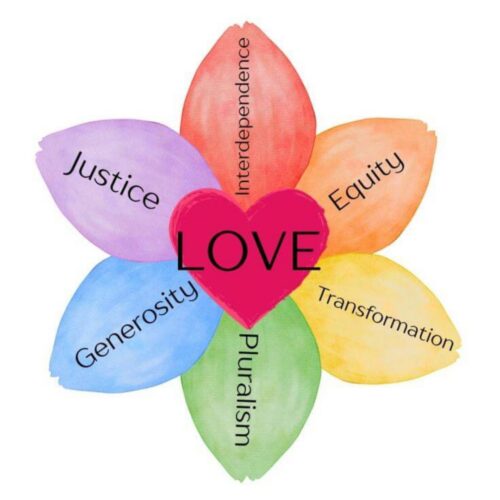What is Unitarian Universalism?
In Unitarian Universalism, you can bring your whole self: your full identity, your questioning mind, your expansive heart.
Together, you can create a force more powerful than one person or one belief system. As a Unitarian Universalist, you do not have to check your personal background and beliefs at the door: you join together on a journey that honors everywhere that everyone has been before.
Unitarian Universalist congregations affirm and promote Shared Values, which are held as strong values and moral guides. Like with the former Principles, the Shared Values “are not dogma or doctrine, but rather a guide for those who choose to join and participate in Unitarian Universalist religious communities.”
These beliefs are diverse and inclusive. There is no shared creed. Unitarian Universalists covenant, congregation-to-congregation and through the Association, to support and assist one another in the ministries, drawing from heritages of freedom, reason, hope, and courage, to build on the foundation of love.
Love is the power that holds everyone together and is at the center of the shared values. All are accountable to one another for doing the work of living the shared values through the spiritual discipline of Love.
Inseparable from one another, these shared values are:
- Interdependence. Honor the interdependent web of all existence. With reverence for the great web of life and with humility, acknowledge everyone’s place in it.
- Covenant to protect Earth and all beings from exploitation. Create and nurture sustainable relationships of care and respect, mutuality and justice. Work to repair harm and damaged relationships.
- Pluralism. Celebrate that all are sacred beings, diverse in culture, experience, and theology.
- Covenant to learn from one another in the free and responsible search for truth and meaning. Embrace each other’s differences and commonalities with Love, curiosity, and respect.
- Justice. Work to be diverse multicultural Beloved Communities where all thrive.
- Covenant to dismantle racism and all forms of systemic oppression. Support the use of inclusive democratic processes to make decisions within the congregations, the Association, and society at large.
- Transformation. Adapt to the changing world.
- Covenant to collectively transform and grow spiritually and ethically. Openness to change is fundamental to the Unitarian and Universalist heritages, never complete and never perfect.
- Generosity. Cultivate a spirit of gratitude and hope.
- Covenant to freely and compassionately share faith, presence, and resources. Generosity connects us to one another in relationships of interdependence and mutuality.
- Equity. Every person is inherently worthy and has the right to flourish with dignity, love, and compassion.
- Covenant to use everyone’s time, wisdom, attention, and money to build and sustain fully accessible and inclusive communities.
Unitarian Universalism has a deep and diverse history, dating back to sixteenth century Transylvania (the Unitarian side) and to eighteenth century America (the Universalist roots). As historian Reverend Mark W. Harris writes in his pamphlet, Unitarian Universalist Origins: Our Historic Faith, people who expressed a belief “in free human will and the loving benevolence of God, eventually became Unitarian.” During the first four decades of the nineteenth century, hundreds of congregational churches fought over ideas about sin and salvation, and especially over the doctrine of the Trinity. In 1819, Unitarian minister William Ellery Channing delivered a sermon called ‘Unitarian Christianity’ and helped to give the Unitarians a strong platform. Six years later the American Unitarian Association was organized in Boston, Massachusetts.
Of Universalist history, Harris writes, “From its beginnings, Universalism challenged its members to reach out and embrace people whom society often marginalized.” The Gloucester, Massachusetts church included a freed slave among its charter members, and the Universalists became the first denomination to ordain women to the ministry, beginning in 1863 with Olympia Brown. Universalism was a more evangelical faith than Unitarianism. After officially organizing in 1793, the Universalists spread their faith across the eastern United States and Canada, “promoting the belief that all people are the children of God, rather than a chosen few.”
After growing increasingly theologically and ethically close, the Unitarian and Universalist denominations consolidated in 1961 to form Unitarian Universalism.


 Love Leads the Way Capital Campaign is underway!
Love Leads the Way Capital Campaign is underway!